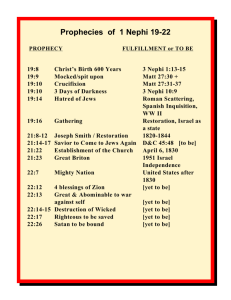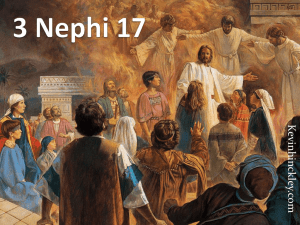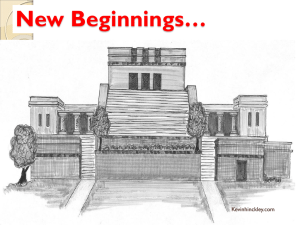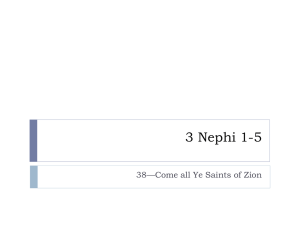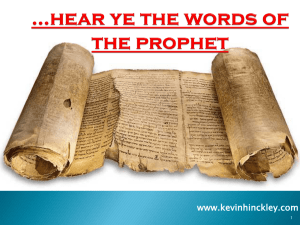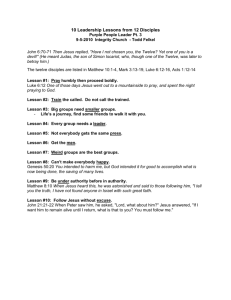Test your Nephite Apostle Knowledge!!!!
advertisement
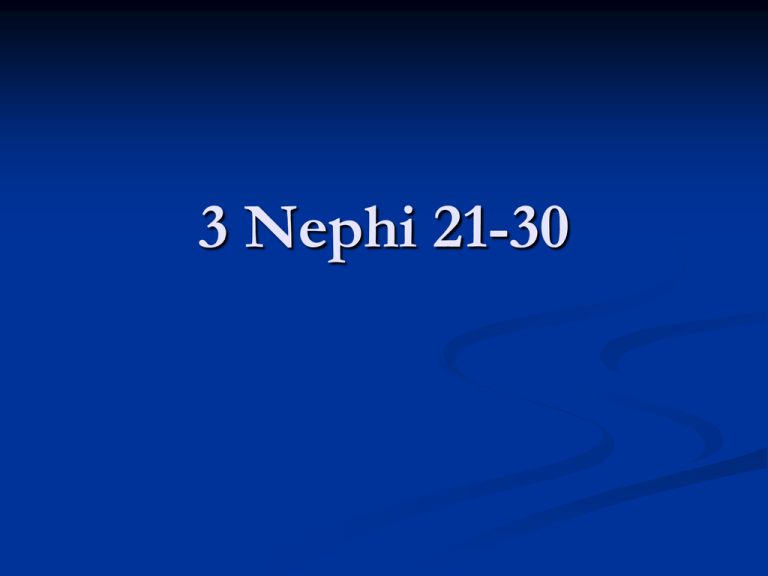
3 Nephi 21-30 3 Nephi 23:1Search…Isaiah Look through 3 Nephi 22 to find: Sterility Adoption of illegitimate children A widow’s grief Infidelity Reconciliation Protection from bandits Look through 3 Nephi 22 to find: Sterility (1) Adoption of illegitimate children (3) A widow’s grief (4) Infidelity (4) Reconciliation (7-14) Protection from bandits (15-17) 3 Nephi 23:5 “When individual members and families immerse themselves in the scriptures regularly and consistently, other areas of activity will automatically come. Testimonies will increase. Commitment will be strengthened. Families will be fortified. Personal revelation will flow” (Ensign, 5/86, 81). The Gospel You run into an old friend in the airport that is not a member of the Church. He was always impressed by the lifestyle you had and your example. He wants to know what you believe, but they just called for him to board his flight. Sum up the gospel in one sentence. The Gospel (continued) Pass your definition to the person behind you. Now read 3 Nephi 27:13-22 and see how the person did. Christ used more than one sentence, of course, but these verses are a summation of the gospel. “Ought” “Said the risen Lord: ‘What manner of men ought ye to be? Verily I say unto you, even as I am’ (3 Nephi 27:27). The meaning of the word ought, as used in His question ‘What manner of men ought ye to be?’ is crucial to understanding His answer, ‘Even as I am.’ The word ought means ‘to be necessary’ or ‘to be held or bound in duty or moral obligation’ (Noah Webster’s First Edition of an American Dictionary of the English Language, 7th ed. [1993], ‘ought’; see also Luke 24:26), suggesting—and the holy scriptures, ancient and modern, confirm—that it is ‘necessary,’ and that we are ‘bound,’ as by covenant, ‘to be,’ as He declared, ‘even as I am’ (3 Nephi 27:27; see also 3 Nephi 12:48; Matthew 5:48; 1 John 3:2; Moroni 7:48)” (John M. Madsen, CR, Apr. 2002, 93; or Ensign, May 2002, 79). Test your Nephite Apostle Knowledge!!!! 3 Nephi 28 True or False 1)The Twelve Disciples chosen by Jesus were not apostles. There can only be twelve apostles on the earth at a time and there were already twelve in Jerusalem. 2)9 of the 12 wanted to die at the age of man, 100, and be back with Jesus as soon as possible. 3)Jesus asked the other 3 Disciples if they would remain on earth until His 2nd Coming. 4)Jesus told the Three that they were “more blessed” for remaining. 5)The Three were promised they would feel no pains or sorrows at all any more. 6)The Three Nephites will never die. 7)Nothing can kill the Three Disciples—fire, wild beasts, etc… Nothing, that is, except a silver bullet. 8)The names of the Three Disciples that remained are Nephi, Timothy and Jonas. 9)The Three Nephites can show themselves to whomever they like and did show themselves to Mormon and Moroni. 10)The 3 have preached among the Nephites, the Jews, the 10 Tribes and the Gentiles and will bring forth many souls until the Second Coming. True or False 1)The Twelve Disciples chosen by Jesus were not apostles. There can only be twelve apostles on the earth at a time and there were already twelve in Jerusalem.(Joseph Fielding Smith quotation) 2)9 of the 12 wanted to die at the age of man, 100, and be back with Jesus as soon as possible. (2-3) 3)Jesus asked the other 3 Disciples to remain on earth until His 2nd Coming. (5-6) 4)Jesus told the Three that they were “more blessed” for remaining.(7) 5)The Three were promised they would feel no pains or sorrows at all any more. (9) 6)The Three Nephites will never die.(7-8, Joseph Smith quotation; D&C 42:45-46) 7)Nothing can kill the Three Disciples—fire, wild beasts, etc… Nothing, that is, except a silver bullet. (19-23) 8)The names of the Three Disciples that remained are Nephi, Timothy and Jonas. (25; 4 Nephi 1:19) 9)The Three Nephites can show themselves to whomever they like and did show themselves to Mormon and Moroni. (26, 30; Mormon 8:11) 10)The 3 have preached among the Nephites, the Jews, the 10 Tribes and the Gentiles and will bring forth many souls until the Second Coming. (27-32) Nephite Disciples=Apostles? While in every instance the Nephite twelve are spoken of as disciples, the fact remains that they had been endowed with divine authority to be special witnesses for Christ among their own people. Therefore, they were virtually apostles to the Nephite race, although their jurisdiction was, as revealed to Nephi, eventually to be subject to the authority and jurisdiction of Peter and the twelve chosen in Palestine. According to the definition prevailing in the world an apostle is a witness for Christ, or one who evangelizes a certain nation or people. "A zealous advocate of a doctrine or cause." Therefore the Nephite twelve became apostles, as special witnesses, just as did Joseph Smith and Oliver Cowdery in the Dispensation of the Fulness of Times. (Joseph Fielding Smith, Answers to Gospel Questions, 1:29; see also 1 Nephi 12:8-10) Translation—Not = to Resurrection "Now this Enoch God reserved unto Himself, that he should not die at that time, and appointed unto him a ministry unto terrestrial bodies, of whom there has been but little revealed. He is reserved also unto the presidency of a dispensation, and more shall be said of him and terrestrial bodies in another treatise. He is a ministering angel, to minister to those who shall be heirs of salvation.... Many have supposed that the doctrine of translation was a doctrine whereby men were taken immediately into the presence of God and into an eternal fullness, but this is a mistaken idea. Their place of habitation is that of the terrestrial order and a place prepared for such characters He held in reserve to be ministering angels unto many planets, and who as yet have not entered into so great a fullness as those who are resurrected from the dead. 'Others were tortured, not accepting deliverance, that they might obtain a better resurrection.' (See Hebrews 11:35.) 3 Ne 28 1"Now it was evident that there was a better resurrection, or else God would not have revealed it unto Paul wherein then, can it be said a better resurrection. This distinction is made between the doctrine of the actual resurrection and translation: translation obtains deliverance from the tortures and sufferings of the body, but their existence will prolong as to the labors and toils of the ministry, before they can enter into so great a rest and glory." (Teachings, pp. 170-71; see also John 21:20-23; D&C 7:1-8) “Never Taste of Death” “Translated bodies cannot enter into rest until they have undergone a change equivalent to death" (TPJS, p. 191; see also 1 Corinthians 15:22) The 3 Taken Up Elder Franklin D. Richards offered the following fascinating observation regarding this experience of the Three Nephites: "They wanted to tarry until Jesus came, and that they might He took them into the heavens and endowed them with the power of translation, probably in one of Enoch's temples, and brought them back to the earth. Thus they received power to live until the coming of the Son of Man. I believe He took them to Enoch's city and gave them their endowments there. I expect that in the city of Enoch there are temples; and when Enoch and his people come back, they will come back with their city, their temples, blessings and powers.(JD 25:236-37.)
